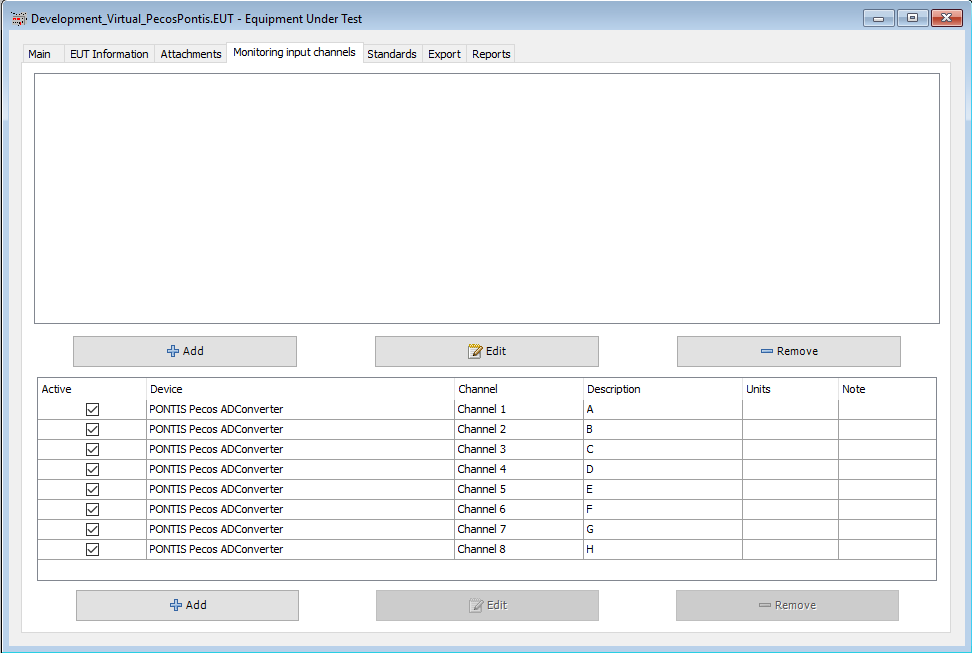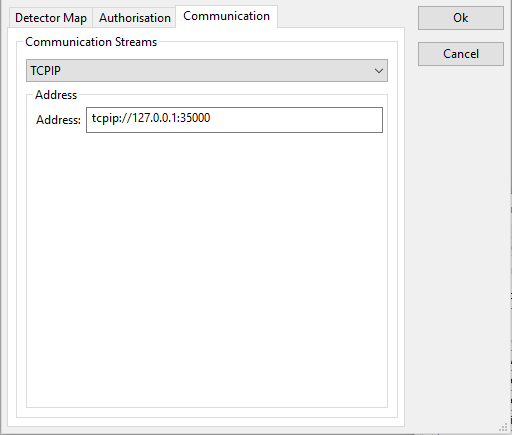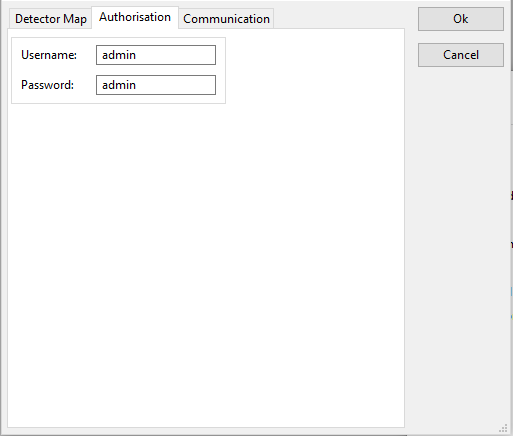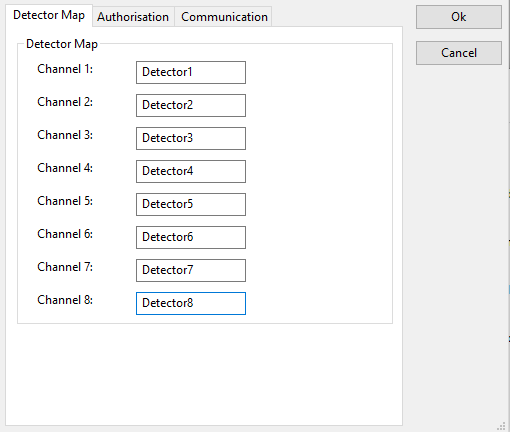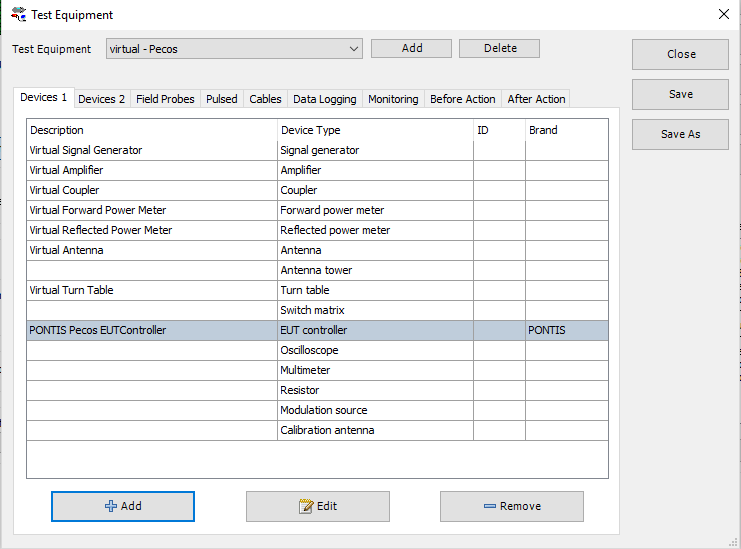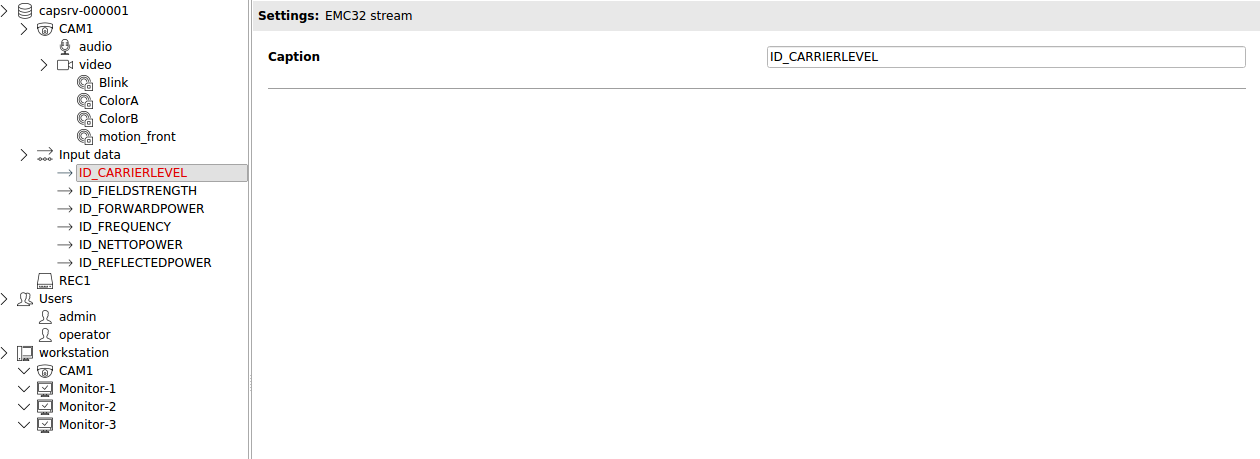RadiMation Application Note 125: Difference between revisions
(Created page with "= Pontis Pecos: Using Pontis Pecos = This application note is intended to make users aware of how to use the Pontis Pecos driver. == Supported features == Tested on and suppo...") |
No edit summary |
||
| Line 1: | Line 1: | ||
= | = Using Pontis Pecos = | ||
This application note is intended to make users aware of how to use the Pontis Pecos driver. | This application note is intended to make users aware of how to use the Pontis Pecos driver. | ||
== Supported features == | == Supported features == | ||
support Pontis Pecos Version 5.1.0 Build 522 | |||
Supports connection over: LAN | Supports connection over: LAN | ||
| Line 9: | Line 9: | ||
Supports up to eight detectors | Supports up to eight detectors | ||
Supports detector types: Colour, Blink, | Supports detector types: Colour, Blink, Motion and OCR | ||
Supports | Supports on screen display for the following measurement data: | ||
*Netto power | *Netto power | ||
*Forward power | *Forward power | ||
* | *Reflected power | ||
*Carrier level | *Carrier level | ||
*Field strength | *Field strength | ||
*Frequency | *Frequency | ||
== Pecos AD Converter == | == Pontis Pecos AD Converter == | ||
=== How to set up the AD converter driver === | === How to set up the AD converter driver === | ||
In the monitoring input channels of the EUT window | The Pecos AD converter driver must be configured In the monitoring input channels of the EUT window. For more information on how to set up AD channels see(reference to another wiki page) | ||
[[File: | [[File:MonitoringWindow.png]] | ||
==== Communication ==== | ==== Communication ==== | ||
The ip-address and port of the machine which hosts the Pecos software must be configured in the communication tab of the advanced settings. This is seen on the image below. | |||
[[File: | [[File:CommunicationTab.png]] | ||
==== Authorization ==== | ==== Authorization ==== | ||
To log in to the Pecos software the credentials for the Pecos software must be stored in the Authorisation tab of the advanced settings of the Pecos driver. This is seen on the image below. | To log in to the Pecos software the user credentials for the Pecos software must be stored in the Authorisation tab of the advanced settings of the Pecos driver. This is seen on the image below. | ||
[[File: | [[File:AuthorizationTab.png]] | ||
==== Detector | ==== Detector map panel ==== | ||
The caption of the detector as configured in the Pecos software must be stored in the advanced setting of the Pontis Pecos AD Converter driver. See image below for the location of these captions. For more information how to configure detector events in the Pecos software see the Pontis Pecos manual | |||
[[File: | [[File:DetectorCaptionLocation.png]] | ||
These settings will determine on which RadiMation AD channels the configured detectors | These settings will determine on which RadiMation AD channels the configured detectors shall be plotted. This is seen on the image below. Note: The values stored in these fields must exactly match the captions of the detectors. | ||
[[File: | [[File:DetectorMapPanel.png]] | ||
== Pecos EUT controller == | == Pontis Pecos EUT controller == | ||
=== How to set up the EUT controller driver === | === How to set up the EUT controller driver === | ||
The Pecos EUT controller driver can be added to a new or already existing test site. This is done by opening the test site configuration and selecting the Pecos EUT controller for the EUT controller driver. | The Pecos EUT controller driver can be added to a new or already existing test site. This is done by opening the test site configuration and selecting the Pontis Pecos EUT controller for the EUT controller driver slot. See image below. | ||
[[File: | [[File:TestSiteConfiguration.png]] | ||
For more information on how to add more drivers | For more information on how to add more drivers to RadiMation see (reference to another wiki page) | ||
==== Communication ==== | ==== Communication ==== | ||
The ip-address and port of the machine which hosts the Pecos software must be configured in the communication tab of the advanced settings. This is seen on the image below. | |||
[[File: | [[File:CommunicationTab.png]] | ||
==== Authorization ==== | ==== Authorization ==== | ||
To log in to the Pecos software the credentials for the Pecos software must be stored in the Authorisation tab of the advanced settings of the Pecos driver. This is seen on the image below. | To log in to the Pontis Pecos software the user credentials for the Pecos software must be stored in the Authorisation tab of the advanced settings of the Pecos driver. This is seen on the image below. | ||
[[File: | [[File:AuthorizationTab.png]] | ||
==== Tags ==== | ==== Tags ==== | ||
When using the on screen display specific captions must be configured in the Pecos software. RadiMation expects the following captions to be present: | When using the on-screen display, specific captions must be configured in the Pontis Pecos software. RadiMation expects the following captions to be present: | ||
*ID_NETTOPOWER -> To display the netto power in dBm | *ID_NETTOPOWER -> To display the netto power in '''dBm''' | ||
*ID_FORWARDPOWER -> To display the forward power in dBm | *ID_FORWARDPOWER -> To display the forward power in '''dBm''' | ||
*ID_REFLECTEDPOWER -> To display the reflected power in dBm | *ID_REFLECTEDPOWER -> To display the reflected power in '''dBm''' | ||
*ID_CARRIERLEVEL -> To display the carrier level in dBm | *ID_CARRIERLEVEL -> To display the carrier level in '''dBm''' | ||
*ID_FIELDSTRENGTH -> To display the field strength in V/m | *ID_FIELDSTRENGTH -> To display the field strength in '''V/m''' | ||
*ID_FREQUENCY -> To display the frequency in MHz | *ID_FREQUENCY -> To display the frequency in '''MHz''' | ||
These captions must be configured as is seen in the image below. For more information how to exactly configure input data streams in the Pecos software see the Pecos manual | These captions must be configured as is seen in the image below. For more information how to exactly configure input data streams in the Pontis Pecos software see the Pontis Pecos manual | ||
[[File: | [[File:PecosStreamCaptions.png]] | ||
== Errors == | == Errors == | ||
The following errors could be raised by the Pecos driver | The following errors could be raised by the Pontis Pecos driver | ||
EC_PONTIS_PECOS_AUTHORIZATION_FAILED: | '''EC_PONTIS_PECOS_AUTHORIZATION_FAILED:''' | ||
"Authorisation has failed. Please make sure the right credentials are used and try again."; | "Authorisation has failed. Please make sure the right credentials are used and try again."; | ||
*When this error is encountered make sure the right login credentials are configured in the authorization tab of the advanced settings of the Pecos driver. | *When this error is encountered make sure the right login credentials are configured in the authorization tab of the advanced settings of the Pecos driver. | ||
EC_DETECTOR_NOT_CONFIGURED: | '''EC_DETECTOR_NOT_CONFIGURED:''' | ||
"Invalid Detector ID configured in Device driver. Please make sure that the configured ID matches the name of the Detector. Also make sure that the detector is enabled in the Pecos software."; | "Invalid Detector ID configured in Device driver. Please make sure that the configured ID matches the name of the Detector. Also make sure that the detector is enabled in the Pecos software."; | ||
*Make sure that the captions of the detectors as configured in the Pecos software matches the captions in the Detector panel tab of the advanced settings of the Pecos AD converter driver. Also check if the detector is enabled in the Pecos software. | *Make sure that the captions of the detectors as configured in the Pecos software matches the captions in the Detector panel tab of the advanced settings of the Pecos AD converter driver. Also check if the detector is enabled in the Pecos software. | ||
EC_TO_MANY_ADCHANNELS_SELECTED: | '''EC_TO_MANY_ADCHANNELS_SELECTED''': | ||
"Too many AD Channels have been configured in RadiMation. Please make sure the number of AD channels matches the amount of detectors."; | "Too many AD Channels have been configured in RadiMation. Please make sure the number of AD channels matches the amount of detectors."; | ||
*In the Monitoring input channels tab of the EUT window more AD channels have been configured than detectors are enabled in the Pecos software. If this is the case verify if all requested detectors are enabled in the Pecos software. If this checks out then less AD channels must be configured since there are not enough detectors to couple to each AD channel. | *In the Monitoring input channels tab of the EUT window more AD channels have been configured than detectors are enabled in the Pecos software. If this is the case verify if all requested detectors are enabled in the Pecos software. If this checks out then less AD channels must be configured since there are not enough detectors to couple to each AD channel. | ||
EC_NotAllBytesRead | '''EC_NotAllBytesRead:''' | ||
*“Not al bytes have been read from the communication channel.” | *“Not al bytes have been read from the communication channel.” | ||
This error is sometimes raised during the initialization of the pecos ADConverter/EUT controller drivers. When this error is raised retry initializing the test. | This error is sometimes raised during the initialization of the pecos ADConverter/EUT controller drivers. When this error is raised retry initializing the test. | ||
EC_External_component_exception | '''EC_External_component_exception:''' | ||
*“External component has thrown exception | *“External component has thrown exception | ||
This error is sometimes raised during the initialization of the pecos ADConverter/EUT controller drivers. When this error is raised retry initializing the test. | This error is sometimes raised during the initialization of the pecos ADConverter/EUT controller drivers. When this error is raised retry initializing the test. | ||
Revision as of 12:34, 20 November 2019
Using Pontis Pecos[edit]
This application note is intended to make users aware of how to use the Pontis Pecos driver.
Supported features[edit]
support Pontis Pecos Version 5.1.0 Build 522
Supports connection over: LAN
Supports up to eight detectors
Supports detector types: Colour, Blink, Motion and OCR
Supports on screen display for the following measurement data:
- Netto power
- Forward power
- Reflected power
- Carrier level
- Field strength
- Frequency
Pontis Pecos AD Converter[edit]
How to set up the AD converter driver[edit]
The Pecos AD converter driver must be configured In the monitoring input channels of the EUT window. For more information on how to set up AD channels see(reference to another wiki page)
Communication[edit]
The ip-address and port of the machine which hosts the Pecos software must be configured in the communication tab of the advanced settings. This is seen on the image below.
Authorization[edit]
To log in to the Pecos software the user credentials for the Pecos software must be stored in the Authorisation tab of the advanced settings of the Pecos driver. This is seen on the image below.
Detector map panel[edit]
The caption of the detector as configured in the Pecos software must be stored in the advanced setting of the Pontis Pecos AD Converter driver. See image below for the location of these captions. For more information how to configure detector events in the Pecos software see the Pontis Pecos manual
These settings will determine on which RadiMation AD channels the configured detectors shall be plotted. This is seen on the image below. Note: The values stored in these fields must exactly match the captions of the detectors.
Pontis Pecos EUT controller[edit]
How to set up the EUT controller driver[edit]
The Pecos EUT controller driver can be added to a new or already existing test site. This is done by opening the test site configuration and selecting the Pontis Pecos EUT controller for the EUT controller driver slot. See image below.
For more information on how to add more drivers to RadiMation see (reference to another wiki page)
Communication[edit]
The ip-address and port of the machine which hosts the Pecos software must be configured in the communication tab of the advanced settings. This is seen on the image below.
Authorization[edit]
To log in to the Pontis Pecos software the user credentials for the Pecos software must be stored in the Authorisation tab of the advanced settings of the Pecos driver. This is seen on the image below.
Tags[edit]
When using the on-screen display, specific captions must be configured in the Pontis Pecos software. RadiMation expects the following captions to be present:
- ID_NETTOPOWER -> To display the netto power in dBm
- ID_FORWARDPOWER -> To display the forward power in dBm
- ID_REFLECTEDPOWER -> To display the reflected power in dBm
- ID_CARRIERLEVEL -> To display the carrier level in dBm
- ID_FIELDSTRENGTH -> To display the field strength in V/m
- ID_FREQUENCY -> To display the frequency in MHz
These captions must be configured as is seen in the image below. For more information how to exactly configure input data streams in the Pontis Pecos software see the Pontis Pecos manual
Errors[edit]
The following errors could be raised by the Pontis Pecos driver
EC_PONTIS_PECOS_AUTHORIZATION_FAILED: "Authorisation has failed. Please make sure the right credentials are used and try again.";
- When this error is encountered make sure the right login credentials are configured in the authorization tab of the advanced settings of the Pecos driver.
EC_DETECTOR_NOT_CONFIGURED: "Invalid Detector ID configured in Device driver. Please make sure that the configured ID matches the name of the Detector. Also make sure that the detector is enabled in the Pecos software.";
- Make sure that the captions of the detectors as configured in the Pecos software matches the captions in the Detector panel tab of the advanced settings of the Pecos AD converter driver. Also check if the detector is enabled in the Pecos software.
EC_TO_MANY_ADCHANNELS_SELECTED: "Too many AD Channels have been configured in RadiMation. Please make sure the number of AD channels matches the amount of detectors.";
- In the Monitoring input channels tab of the EUT window more AD channels have been configured than detectors are enabled in the Pecos software. If this is the case verify if all requested detectors are enabled in the Pecos software. If this checks out then less AD channels must be configured since there are not enough detectors to couple to each AD channel.
EC_NotAllBytesRead:
- “Not al bytes have been read from the communication channel.”
This error is sometimes raised during the initialization of the pecos ADConverter/EUT controller drivers. When this error is raised retry initializing the test.
EC_External_component_exception:
- “External component has thrown exception
This error is sometimes raised during the initialization of the pecos ADConverter/EUT controller drivers. When this error is raised retry initializing the test.
